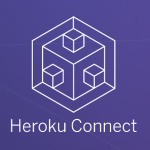About Microsoft Azure SQL Database
Microsoft Azure is a public cloud computing service designed for building, testing, launching, and managing applications and services via Microsoft-managed data centers. Through its platform-as-a-service (PaaS), software-as-a-service (SaaS), and infrastructure-as-a-service (Iaas) offerings, Microsoft Azure integrates with a wide range of programming languages and tools. In addition to working with Microsoft's proprietary software and systems, Azure is compatible with third-party solutions, including Linux. As an extremely popular cloud services platform, many businesses and enterprises have used Microsoft Azure to migrate their computer systems to the cloud and eliminate the costs and staff requirements needed to maintain physical onsite servers.
About Heroku Connect
Heroku Connect is a data integration tool that uses bi-directional synchronization between Salesforce and Heroku Postgres to harmonize Postgres data your Salesforce information like contacts, accounts, and custom objects. Heroku connect includes a user-friendly, point-and-click interface so non-tech-savvy users can set up the service in minutes without coding or complicated configuration procedures.
Popular Use Cases
Bring all your Heroku Connect data to Amazon Redshift
Load your Heroku Connect data to Google BigQuery
ETL all your Heroku Connect data to Snowflake
Move your Heroku Connect data to MySQL
Microsoft Azure SQL Database's End Points
Microsoft Azure Virtual Machines
As one of its IaaS features, Microsoft Azure allows users to deploy virtual machines developed in Windows or Linux.
Microsoft Azure App Services
As one of its PaaS features, Azure App Services allows you to publish and manage websites and web applications.
Microsoft Azure WebApps
WebApps is Microsoft Azure's high-density web hosting service, which allows you to build web applications more efficiently with PHP, Node.Js, or Python, then deploy them on the Azure Cloud.
Microsoft Azure WebJobs
WebJobs gives you the ability to launch applications in the Microsoft App Services space and host them in the cloud.
Microsoft Azure Mobile Engagement Services
Microsoft Azure's mobile engagement service provides real-time tracking, data analytics, and deep insights to better understand user engagement and behavior for your mobile applications.
Microsoft Azure HockeyApp
Microsoft Azure's HockeyApp is a productivity-enhancing driver that helps you design, build, beta test, and distribute mobile apps more efficiently.
Microsoft Azure REST and SDK APIs
Azure's REST and SDK APIs allow you to store and access your application data on Azure's cloud platform.
Microsoft Azure Table Services
Azure Table Services facilitates the storage of data in structured text form so you can access it via a partition and primary key.
Microsoft Azure Blob Service
Blob Service empowers you to store unstructured text information and binary data as 'Blobs' accessible through HTTPS.
Microsoft Azure Queue Service
Queue Service streamlines asynchronous communication across multiple programs.
Microsoft Azure File Service
Azure File Service facilitates cloud data storage via REST API and the SMB Protocol.
Microsoft Azure Search Functionality
Azure's data search functionality supports more efficient data searching with REST and SDK APIs.
Microsoft Azure SQL Data Warehouse
Azure's SQL data warehouse is managed by Microsoft within the Azure Cloud Facility. It offers high-performance querying and enhanced data security.
Microsoft Azure Messaging Service
Azure Service Bus is a messaging service that facilitates communication between the Azure Cloud and applications operating on-site and off-site to build more reliable and scalable applications. The Azure Service Bus supports communication via Event Hubs, Queues, Topics, and Relays.
Microsoft Azure Automation Features
Azure Automation allows users to automate frequently-repeated tasks that they perform in their cloud and enterprise environments to save time and prevent human errors. Automation improves the reliability of common administrative tasks. Azure automation allows you to schedule tasks with runbooks or use Desired State Configuration for the automation of configuration management tasks.
Heroku Connect's End Points
Heroku Connect Synchronization of Apps Across Heroku and Salesforce
Heroku Connect allows you to build apps with open source stacks, natively integrate the apps with Postgres, and directly sync them with Salesforce. By integrating your Salesforce data with Heroku Postgres, it's easy to combine the power of the Lightning Platform with Heroku. Heroku Connect makes the process of building apps that bring your data and processes to your users as easy as coding in SQL.
Heroku Connect External Objects
Heroku Connect External Objects let you make your Heroku Postgres database information available inside your Salesforce deployment. This empowers you to synchronize your information across both platforms as you create, read, update, and delete data. By creating sophisticated applications inside Heroku and making the app data available to your Salesforce processes, you'll present a seamless experience in Salesforce, while all of your data stays inside Heroku Postgres. Moreover, configuring Heroku-Salesforce integrations for data pertaining to apps, sensors, customers, and products is a simple, point-and-click process that doesn't require any coding skills. Heroku External Objects combined with Salesforce Connect makes it easy to create a seamless experience across all of your business systems.
Heroku Connect Data Security Compliance
Heroku Shield Connect supports the development of applications that share sensitive data with Salesforce while complying with the strictest data security standards. Safely integrate CRM data, Protected Health Information (PHI), Personally Identifiable Information (PII), contact information, account data, and custom objects between Heroku apps and Salesforce. Heroku Shield Connect provides an easy pathway for building advanced applications that need to adhere to the most complicated data security regulations, including HIPAA compliance.
Heroku Connect Easy Application Development and Scaling
Through its compatibility with the most popular stacks and programming languages, Heroku Connect facilitates easy application development. Its add-on ecosystem includes your favorite development tools and databases (like New Relic, Mongo, and Redis) so you can use them with the applications you're creating. Through Heroku's proven infrastructure, which currently supports 26 billion daily transactions for massive consumer websites (such as Upworthy and Bonobo) virtually limitless scaling is available for high volume applications.








